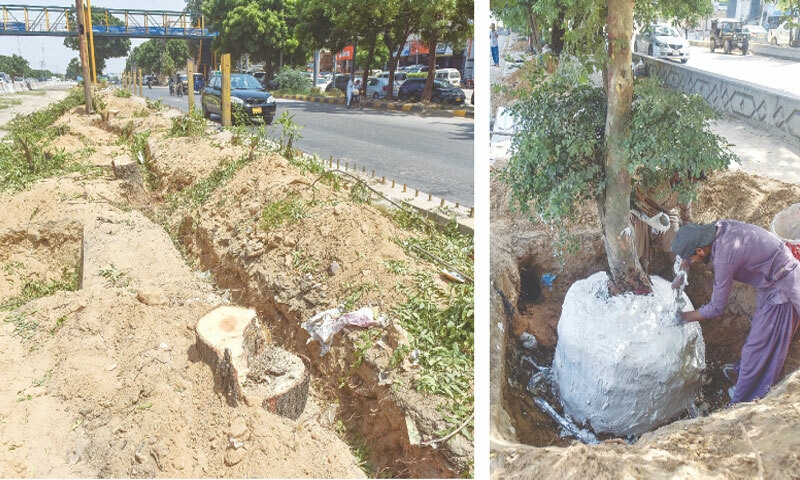KARACHI: Dozens of trees, including local species, in recent days have been cut down in front of the NED University while some trees have been selected for relocation, as part of the civil works currently under way for the 26.6km long Red Line Bus Rapid Transit (BRT) project.
It’s the second time in four months that a major tree-cutting exercise has been undertaken for the development of the much-needed Red Line BRT — a $504 million project funded by multiple agencies including the Green Climate Fund.
In May this year, a large number of trees located between Check Post No.6 and Tank Chowk within the jurisdiction of the Malir Cantonment Board were cut down.
“Only 51 trees have been cut down in front of the NED University in recent days. The team has already initiated the process of relocating 1,300 local species in the Aladin Park, a portion of which would be developed as an urban forest,” Mehvish Zehra, manager corporate communications at TransKarachi, a public sector company implementing the project, clarified.
About chopping down local species, Zehra explained that not all trees could be relocated and only those local species were being selected for this process which met a certain criteria.
“Trees with a girth of more than 200mm are being relocated manually while those having a girth of more than 450 mm are being replanted using machines. The trees being relocated include lignum, Sumbal, Gul Mohar, Peepal, coconut, neem, date palm and other fruit bearing species.”
According to officials, the total number of trees located in the BRT route is 7,782, the majority of which are conocarpus, an exotic species that’s known to have some environmental effects, and wouldn’t be relocated.
Under the project, 1,564 trees have been removed between Tank Chowk and Check Post No. 6 while 3,802 trees located between Tank Chowk and Safoora would be cut down.
To compensate for the loss, 50,000 trees — each having a height of five feet — would be planted along the bus route and in some other areas of the city.
About the project’s current status, Zehra said 70 per cent of the construction of a storm water drain on both sides of the road from Tank Chowk to Check Post No. 6 had been completed while the diversion of Tipu Sultan underpass was in progress.
Bio-hybrid BRT buses
According to officials, the third-generation BRT would deliver a zero-emission sustainable transportation system with 250 bio-hybrid BRT buses running on a dedicated corridor from Malir Halt to Numaish.
For this purpose, a bio gas plant is being set up near the Cattle Colony in Landhi to produce biomethane from agricultural waste.
“It’s would be a game changer for citizens of Karachi as the project would deliver several environmental benefits once the system is operationalised,” Zehra claimed.
Adverse effect on environment
Experts, however, believed that tree relocation and the new plantation planned under the project would in no way make up for the green cover loss.
“The survival rate of relocated trees is too low. Second, new plantation can never match the high rate of carbon sequestration and oxygen emission of old trees, which have deep root system,” contended senior ecologist and researcher Prof Zafar Iqbal Shams, adding that the sudden loss of tree cover even though of conocarpus would adversely affect the environment.
He regretted lack of planning in tree plantation and accountability at the government level due to which the city had often seen plantation of exotic species at public spaces in large numbers and later their destruction in the name of development.
Published in Dawn, September 8th, 2022













































